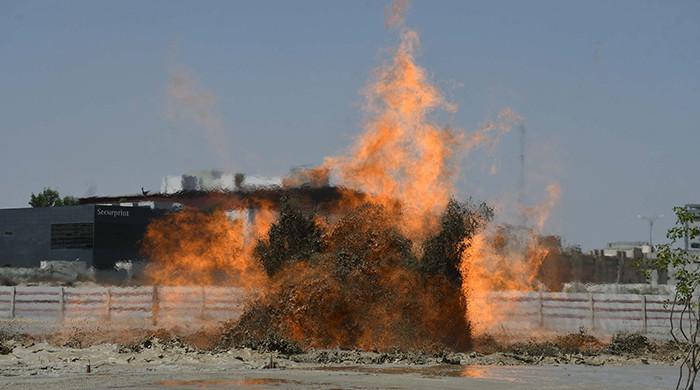Govt vows sustained efforts for climate resilience: Ahsan Iqbal
Apart from climate change, Pakistan is also grappling with economic effects of Covid-19, inflation due to Ukraine conflict
March 29, 2023

Minister for Planning and Development Ahsan Iqbal said that despite enduring climate-related disaster last year that cost the country billions of rupees, Pakistan is determined to building long-term resilience and adaptation measures.
Speaking at the 10th Asia-Pacific Forum on Sustainable Development-2023 in Bangkok, he outlined Pakistan's challenges as well as its successes.
With less than one percent of total global greenhouse emissions, Pakistan is still one of the countries most vulnerable to climate change, the planning minister said.
In addition to climate change, Pakistan is also grappling with the economic effects of Covid-19, inflation due to the Ukraine-Russia conflict, and the financial toll of severe climate disasters which has resulted in a loss of 30 billion dollars, he underscored.
The forum's theme, "Accelerating the recovery from Coronavirus disease and the full implementation of the 2030 Agenda for Sustainable Development at all levels in Asia and the Pacific", highlights the importance of cooperation and progress towards a sustainable future.
Pakistan faces consequences of climate change
Pakistan is facing the severe consequences of climate change, with a series of devastating events impacting the country. In 2022, unprecedented heatwaves swept across Pakistan from April to June, followed by a prolonged and intense monsoon season, resulting in the country's worst flooding in a century. Glacial lakes burst, rivers broke their banks, flash flooding occurred, and landslides took place, leaving the country grappling with the aftermath.
As one of the most vulnerable countries in the world to climate change, Pakistan is striving to enhance its disaster response capabilities, particularly in the Kashmir region, which is prone to deadly floods, droughts, landslides, and earthquakes. To improve the response to such disasters, the government established emergency response centres across the region, enabling faster communication with the National Disaster Management Authority. The federal agency issues early warnings, coordinates rescue services, and provides aid.
The impact of climate change on Pakistan has been significant, with an Asian Development Bank study revealing that the country has faced 21 major floods between 1950 and 2011, equivalent to almost one flood every three years, resulting in a loss of about $19 billion. The devastation caused by floods in 2010 alone amounted to approximately $10 billion.
The consequences of climate change are far-reaching, and Pakistan is not immune to their effects. The United Nations Development Agency recently reported that, in addition to the 33 million people impacted by the floods in 2022, a further nine million people in Pakistan risk being pushed into poverty due to climate change-related events. These dire consequences underline the urgent need for Pakistan and the international community to take action to address the effects of climate change and reduce their impact on vulnerable communities.











